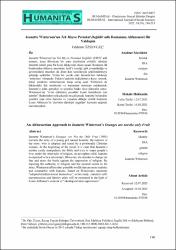| dc.contributor.author | Özsevgeç, Yıldırım | |
| dc.date.accessioned | 2023-03-02T06:24:43Z | |
| dc.date.available | 2023-03-02T06:24:43Z | |
| dc.date.issued | 2022 | en_US |
| dc.identifier.citation | Özsevgeç, Y. (2022). Jeanette Winterson’un Tek Meyve Portakal Değildir adlı romanına
Althusserci bir yaklaşım. Humanitas, 10(19), 190-213. https://doi.org/10.20304/humanitas.970336 | en_US |
| dc.identifier.issn | 2147-088X | |
| dc.identifier.issn | 2645-8837 | |
| dc.identifier.uri | https://doi.org/10.20304/humanitas.970336 | |
| dc.identifier.uri | https://hdl.handle.net/11436/7746 | |
| dc.description.abstract | Jeanette Winterson’un Tek Meyve Portakal Değildir (1985)2 adlı
romanı, koyu Hristiyan bir anne tarafından evlatlık edinilen
Jeanette isimli genç bir kızın hikâyesini okura sunar. Romanın ilk
başlarından itibaren annesinin İncil’i istediği gibi yorumladığı ve
çevresindeki insanları da dinin katı kurallarıyla şekillendirmeye
çalıştığı aşikârdır. Yetim bir çocuk olan Jeanette’ten beklenen
‘misyoner’ olmasıdır. Fakat o kaderini değiştirmeye karar vererek,
dinin kendisini sömürmesine karşı savaş açar. Winterson da
hikâyedeki din otoritesini ve toplumsal normları reddederek,
Jeanette’e daha gerçekçi ve uyumlu başka olası dünyalar sunar.
Winterson’un “evlat edinilmiş çocuklar kendi kendilerini icat
ederler” ifadesinden yola çıkarak bu çalışmada Jeanette’in kendini
yeniden inşa etme durumu ve yaşamış olduğu kimlik bunalımı
Louis Althusser’in ‘devletin ideolojik aygıtları’ kavramı ışığında
incelenecektir. | en_US |
| dc.description.abstract | Jeanette Winterson’s Oranges Are Not the Only Fruit (1985)
narrates the story of a young girl named Jeanette, the narrator of
the story, who is adopted and raised by a profoundly Christian
woman. At the beginning of the novel, it is clear that Jeanette’s
mother easily manipulates the Bible and tries to shape people’s
lives under the strict rules of religion. As an orphan child, Jeanette
is expected to be a missionary. However, she decides to change her
fate and starts the battle against the oppression of religion. By
rejecting the authority of religion and the societal norms in the
story, Winterson offers other possible worlds that are more realistic
and compatible with Jeanette. Based on Winterson's statement
“adopted children invent themselves”, in this study, Jeanette's selfreconstruction and identity crisis will be examined in the light of
Louis Althusser's concept of “ideological state apparatuses”. | en_US |
| dc.language.iso | tur | en_US |
| dc.publisher | Tekirdağ Namık Kemal Üniversitesi | en_US |
| dc.rights | info:eu-repo/semantics/openAccess | en_US |
| dc.subject | Kimlik | en_US |
| dc.subject | DİA | en_US |
| dc.subject | Cinsiyet | en_US |
| dc.subject | Din | en_US |
| dc.subject | Jeanette Winterson | en_US |
| dc.subject | Identity | en_US |
| dc.subject | DIA | en_US |
| dc.subject | Gender | en_US |
| dc.subject | Religion | en_US |
| dc.title | Jeanette Winterson’un Tek Meyve Portakal Değildir adlı romanına Althusserci bir yaklaşım | en_US |
| dc.title.alternative | An Althusserian approach to Jeanette Winterson’s Oranges are not the only Fruit | en_US |
| dc.type | article | en_US |
| dc.department | RTEÜ, Fen - Edebiyat Fakültesi, İngiliz Dili ve Edebiyatı Bölümü | en_US |
| dc.institutionauthor | Özsevgeç, Yıldırım | |
| dc.identifier.doi | 10.20304/humanitas.970336 | en_US |
| dc.identifier.volume | 10 | en_US |
| dc.identifier.issue | 19 | en_US |
| dc.identifier.startpage | 190 | en_US |
| dc.identifier.endpage | 213 | en_US |
| dc.relation.journal | HUMANITAS - Uluslararası Sosyal Bilimler Dergisi | en_US |
| dc.relation.publicationcategory | Makale - Uluslararası Hakemli Dergi - Kurum Öğretim Elemanı | en_US |


















